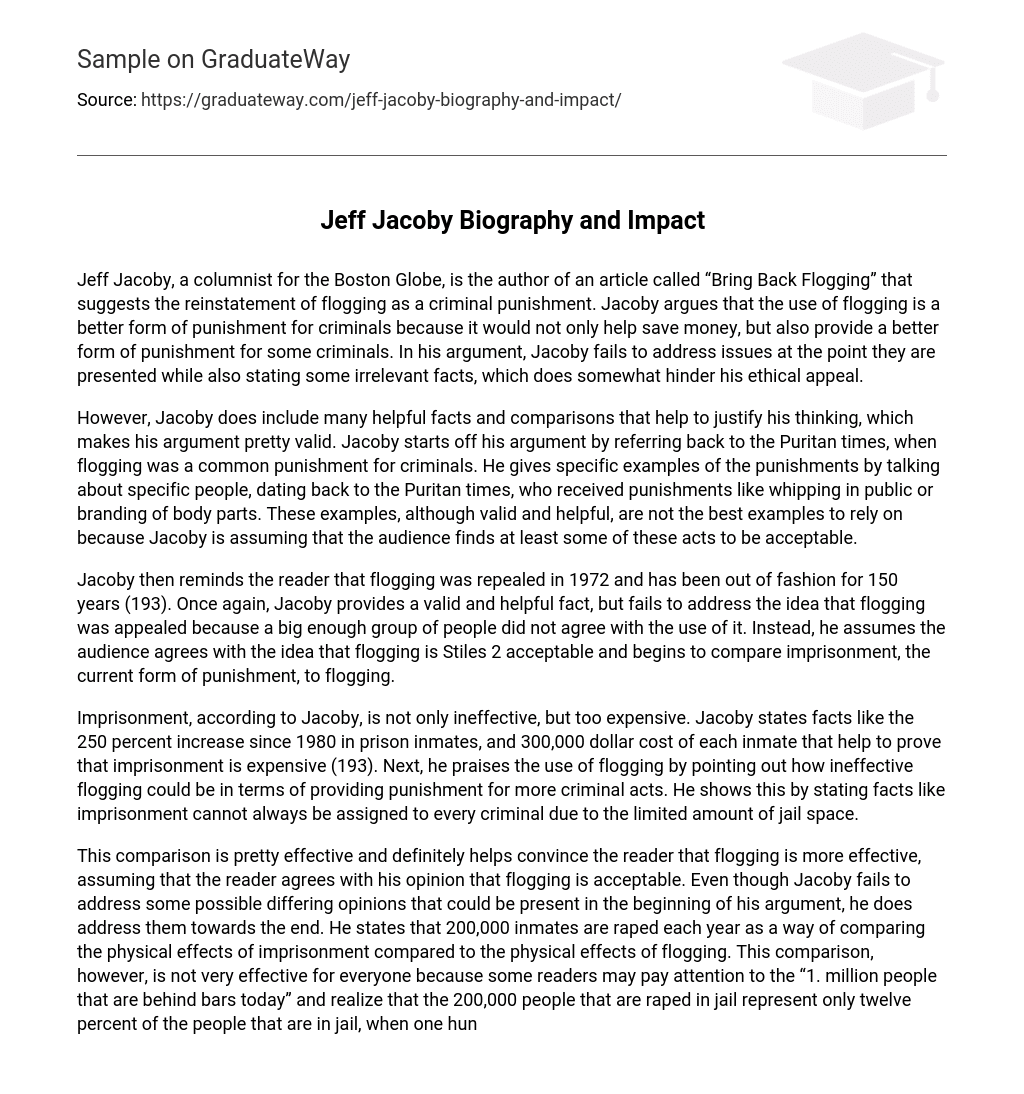In his article titled “Bring Back Flogging,” Jeff Jacoby, a columnist for the Boston Globe, proposes the reintroduction of flogging as a penalty for criminals. Jacoby asserts that not only would flogging be economical, but it would also be a more suitable means of punishment for specific offenders. However, he neglects to adequately acknowledge concerns and includes extraneous information, thereby diminishing his ethical persuasion.
Despite assuming that the audience finds some of the acts acceptable, Jacoby’s argument becomes fairly valid due to the inclusion of many helpful facts and comparisons that justify his thinking. He supports his argument by referencing the Puritan times, when flogging was a common punishment for criminals, and provides specific examples of punishments endured by individuals dating back to that era. These examples, although not the strongest, aid in validating Jacoby’s perspective.
Jacoby then points out that flogging was abolished in 1972 and has not been commonly used for the past 150 years (193). Although this is a valuable piece of information, Jacoby fails to acknowledge that flogging was abolished due to significant opposition from a considerable portion of the population. Instead, he assumes that the readers already agree that flogging is acceptable and proceeds to draw comparisons between imprisonment, the present-day method of punishment, and flogging.
According to Jacoby, prison sentences are both ineffective and costly. He supports this argument by presenting statistics such as the 250 percent rise in prison populations since 1980, as well as the hefty $300,000 expense per inmate (193). Additionally, Jacoby highlights the potential benefits of alternative forms of punishment, specifically flogging. He emphasizes the inefficacy of imprisonment in adequately addressing criminal acts, as not all offenders can be accommodated due to limited jail capacity.
The effectiveness of this comparison is convincing, assuming agreement with the author’s view that flogging is acceptable. Although some differing opinions are not initially addressed, they are acknowledged later on. Comparing the physical effects of imprisonment to those of flogging, the author highlights that 200,000 inmates are raped each year. However, this comparison may not be effective for all readers as it neglects the fact that these 200,000 individuals represent only twelve percent of the total incarcerated population, while one hundred percent of those flogged will be harmed. If this fact is forgotten, it becomes easier to persuade the reader that flogging can and should be utilized in modern times. The article’s effective argumentation is built upon two key elements: tone and organization.
The essay has a calm and sarcastic tone, which helps to establish a strong and unbiased argument. For instance, when discussing the modern approach to punishing criminals, Jacoby does not simply mention imprisonment but instead states: “…we practice a more enlightened, more humane way of disciplining wrongdoers: We lock them up in cages” (193). Although this statement might appear sarcastic and biased, he supports it throughout the essay by discussing the shortcomings of imprisonment compared to other methods such as flogging.
His use of sarcasm, supported by reasoning and facts, makes his article informative and compelling. The organization of the article is strong as he begins with the Puritans, introducing the subject and addressing all his points. He then poses thought-provoking questions to the audience, such as “Are we quite certain the Puritans have nothing to teach us about dealing with criminals?” (194), encouraging further reflection. Following these questions, he seeks to strengthen his argument about flogging by addressing opposing views.
He concludes the article by reiterating his initial focus on the Puritans, which effectively contributes to its strong and persuasive tone and structure. Jacoby skillfully supports his viewpoints with evidence, while maintaining reader interest through his strong tone and organization. Despite some potential flaws that may impact his ethical appeal, the overall strength and persuasiveness of the article is undeniable.





